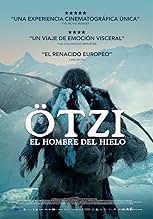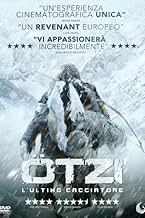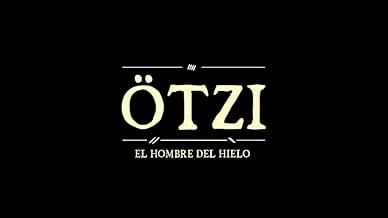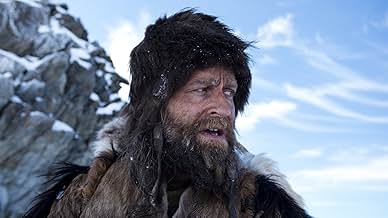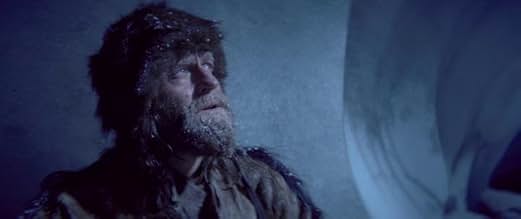IMDb RATING
6.4/10
3.2K
YOUR RATING
The Ötztal Alps, more than 5300 years ago. A Neolithic clan has settled near a creek. It is their leader Kelab's responsibility to be the keeper of the group's holy shrine Tineka. While Kela... Read allThe Ötztal Alps, more than 5300 years ago. A Neolithic clan has settled near a creek. It is their leader Kelab's responsibility to be the keeper of the group's holy shrine Tineka. While Kelab is hunting, the settlement is attacked.The Ötztal Alps, more than 5300 years ago. A Neolithic clan has settled near a creek. It is their leader Kelab's responsibility to be the keeper of the group's holy shrine Tineka. While Kelab is hunting, the settlement is attacked.
- Awards
- 5 nominations
- Director
- Writer
- All cast & crew
- Production, box office & more at IMDbPro
Storyline
Did you know
- TriviaBlood from four different people was actually found on the real-life Ötzis' belongings, supporting the idea that he led a sometimes violent life.
- GoofsIn the film the Berkshire pig is discernible. This is a British breed (a rare breed) of pig originating in the early 19th century, thus, it could not have been there in the Alps more than 5000 years ago.
- ConnectionsEdited into heute-show: Folge 309 (2019)
Featured review
A Neolithic revenge story seeks to explain the mysterious man found frozen in the Alps. Written and directed by Felix Randau, and originally release in Germany in 2017 as Der Mann aus dem Eis, Iceman purports to tell the story of a Copper Age man preserved in the frozen Alps for 5,000 years. Beautiful landscapes and harrowing authenticity help balance what might otherwise be a one-dimensional revenge plot.
Kelab (Jürgen Vogel), Kisis (Susanne Wuest), and their clan are living in the Ötztal Alps around 3000 BC, where Kelab protects a fetish called Tineka. The clan is blessed with the birth of a child, but grieved by the loss of its mother. When Kelab is off hunting in the woods, a trio of raiders attack his village, slaughter its inhabitants, and steal their idol. Filled with a desire for revenge, Kelab rescues the newborn and pursues the raiders.
Along the way, Kelab interacts with other Neolithic people, including an old man, Ditob (Franco Nero), and his daughter Mitar (Violetta Schurawlow), in their sparsely populated valley. Can Kelab survive the harsh elements to exact revenge and take back his sacred Tineka?
Iceman was inspired by Ötzi the Iceman. In 1991, Alpine hikers discovered a mummified body partially frozen in ice. Shockingly, scientists dated its age to somewhere between 3400 and 3100 BC. The adult male was so well preserved that scientists were able to determine precisely what he ate in the days before he died. Most intriguingly, they discovered his cause of death was an arrow impaled in his back, compounded by other injuries.
It's impossible to say for certain who this man was and the larger circumstances leading to his death, but evidence gathered from his corpse informs Iceman in a credible and convincing way. Scientists identified blood from at least four other people on his weapons and clothing, so we know he was involved in a violent struggle. The film is so authentic its characters even speak an early version of Rhaetic, a language related to Etruscan and spoken by pre-Indo Europeans living in that region.
Like Alpha (2018), Iceman has great cinematography, was shot in beautiful and sweeping landscapes, and tries to authentically re-create prehistoric culture. Unlike Alpha, however, Iceman has a realistic story. When one man falls from a sheer cliff, he breaks his back instead of being conveniently saved by ridiculously improbable circumstances.
But for all its good qualities, Iceman left something to be desired. The 1981 French film Quest for Fire, in which the the dialog is also spoken in a prehistoric language, benefited from rich interactions between the characters. In contrast, Iceman was oddly solipsistic. Interactions between characters were kept at a bare minimum. I expected much more, particularly when it came to Kelab and his encounters with other humans. I'm not an anthropologist, but I'm pretty sure we were able to communicate and express emotions other than anger back then.
Iceman was generally praised by critics, but left audiences shrugging their shoulders. It currently has an audience favorability rating of 54% on RottenTomatoes. I probably would've had the same reaction if I didn't love historically authentic films. For me, seeing this primitive man's world come to life more than made up for Iceman's deficiencies.
Kelab (Jürgen Vogel), Kisis (Susanne Wuest), and their clan are living in the Ötztal Alps around 3000 BC, where Kelab protects a fetish called Tineka. The clan is blessed with the birth of a child, but grieved by the loss of its mother. When Kelab is off hunting in the woods, a trio of raiders attack his village, slaughter its inhabitants, and steal their idol. Filled with a desire for revenge, Kelab rescues the newborn and pursues the raiders.
Along the way, Kelab interacts with other Neolithic people, including an old man, Ditob (Franco Nero), and his daughter Mitar (Violetta Schurawlow), in their sparsely populated valley. Can Kelab survive the harsh elements to exact revenge and take back his sacred Tineka?
Iceman was inspired by Ötzi the Iceman. In 1991, Alpine hikers discovered a mummified body partially frozen in ice. Shockingly, scientists dated its age to somewhere between 3400 and 3100 BC. The adult male was so well preserved that scientists were able to determine precisely what he ate in the days before he died. Most intriguingly, they discovered his cause of death was an arrow impaled in his back, compounded by other injuries.
It's impossible to say for certain who this man was and the larger circumstances leading to his death, but evidence gathered from his corpse informs Iceman in a credible and convincing way. Scientists identified blood from at least four other people on his weapons and clothing, so we know he was involved in a violent struggle. The film is so authentic its characters even speak an early version of Rhaetic, a language related to Etruscan and spoken by pre-Indo Europeans living in that region.
Like Alpha (2018), Iceman has great cinematography, was shot in beautiful and sweeping landscapes, and tries to authentically re-create prehistoric culture. Unlike Alpha, however, Iceman has a realistic story. When one man falls from a sheer cliff, he breaks his back instead of being conveniently saved by ridiculously improbable circumstances.
But for all its good qualities, Iceman left something to be desired. The 1981 French film Quest for Fire, in which the the dialog is also spoken in a prehistoric language, benefited from rich interactions between the characters. In contrast, Iceman was oddly solipsistic. Interactions between characters were kept at a bare minimum. I expected much more, particularly when it came to Kelab and his encounters with other humans. I'm not an anthropologist, but I'm pretty sure we were able to communicate and express emotions other than anger back then.
Iceman was generally praised by critics, but left audiences shrugging their shoulders. It currently has an audience favorability rating of 54% on RottenTomatoes. I probably would've had the same reaction if I didn't love historically authentic films. For me, seeing this primitive man's world come to life more than made up for Iceman's deficiencies.
Details
- Release date
- Countries of origin
- Official site
- Language
- Also known as
- Ötzi, el hombre del hielo
- Filming locations
- Alto Adige/Südtirol, Italy(location)
- Production companies
- See more company credits at IMDbPro
Box office
- Gross US & Canada
- $2,138
- Opening weekend US & Canada
- $1,372
- Mar 17, 2019
- Gross worldwide
- $6,719
- Runtime1 hour 36 minutes
- Color
- Aspect ratio
- 2.35 : 1
Contribute to this page
Suggest an edit or add missing content



